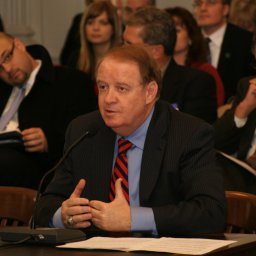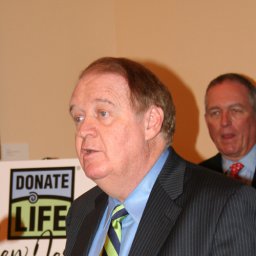Senate President Sets the Record Straight on Organ Donor Bill
TRENTON � With the Assembly Health and Senior Services Committee approving the NJ Hero Act today, Senate President Richard J. Codey (D-Essex) set the record straight on a number of myths and misunderstandings being reported about the bill he recently introduced to help save lives and increase organ donation.
�The goal of this bill, plain and simple, is to increase the number of registered organ donors by starting a conversation early and often so that everyone understands the importance of organ donation,� said Sen. Codey. �There has been a tremendous amount of inaccuracies reported in newspapers and echoed on the radio and I want to set the record straight. This bill is about compassion and understanding, not strong arming.�
In doing so, Senator Codey released the following facts on the NJ Hero Act, bill S755/A2083:
The NJ Hero Act is so named to highlight the heroic act of donating one�s organs and tissues to save and enhance the lives of others. In doing so, it contains two major initiatives:
1. Anyone applying for a driver�s license or identification card to first answer a few simple questions regarding organ donation, including: Would you like to be an organ donor? If not, would you like to designate someone to make that decision for you?
2. Education for public high school, higher education, and medical school and nursing school students and professionals in order to dispel myths associated with organ donation, provide accurate information, and emphasize the fundamental responsibility of individuals to take appropriate action, when able, to help save another person�s life.
MYTH: I am being forced to make a decision that I might not be ready to make yet.
REALITY: Taking into account countless factors, including religion, the Hero Act does NOT, in any way, force you to make a decision about organ donation. If you are not ready to be a donor or designate a decision maker in your place, you do not have to. The goal is to generate a conversation and hopefully an awareness of organ donation. You will always maintain the right to NOT be a donor.
MYTH: I am being forced to acknowledge the importance of organ donation, even if I don�t agree with it.
REALITY: The Hero Act in no way forces you to take a stance that runs counter to your beliefs. If you do not wish to be a donor or designate a decision maker, you simply have to acknowledge that you have read through this process by checking off a box that states, �I have reviewed the importance of organ donation.� This is merely a formality to ensure that you have completed the process before applying for a driver�s license or ID card, with the end goal being to make people consciously aware of the need for organ donation.
MYTH: If I designate a decision maker, it will be noted on my license and maintained in a Motor Vehicle Commission (MVC) database.
REALITY: No, the MVC registry is an affirmative registry and only collects the names of those who wish to be an organ donor. If you wish to designate a decision maker, you will be able to obtain a form through an MVC office or their Web site that will serve much like a living will. This will be a private document kept only by you. When the time calls for it, you and/or your family will be responsible for presenting it.
MYTH: This bill is going to force people to make a critical, life altering decision in a rush while they are at a busy MVC office.
REALITY: You can complete the process at any time prior to obtaining your license either by doing so online or by picking up a form at your MVC office ahead of time. This will enable you to make a thoughtful decision in the privacy of your own home and with the advice of family, friends or clergy.
MYTH: This bill places a burden on teachers and administrators by forcing them to cram it into the curriculum.
REALITY: Both the NJEA and the NJ Department of Education have been involved in helping to craft this bill. The Department of Education has been charged with developing a balanced and unbiased presentation of the issue.
MYTH: I just read in the paper that we�re doing great on organ donation, why do we even need this bill?
REALITY: Although a record number of New Jersey residents signed up to be organ donors last year, we still have a long way to go to bridge the gap between those who desperately need a transplant and those who are willing to donate. The fact still remains that roughly 4,200 New Jersey residents are presently waiting for a life saving organ donation. Furthermore, each year roughly 6,000 people in this country die while waiting for an organ transplant.
# # #



